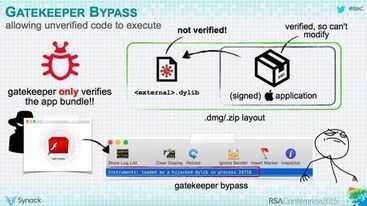Researchers at BAE just reported on a Mac bot known as OSX/Agent-ANTU that was allegedly distributed in a novel way.
The crooks used a security hole in a controversial Mac security and cleanup utility called MacKeeper.
MacKeeper quickly patched the hole after it became known, but until you received the update you were at risk of a Remote Code Execution (RCE) hole.
As long as you were unpatched, a crook could simply entice or redirect you to a poisoned website, and use a single line of JavaScript to send a command script to MacKeeper, which would then run it.
Unfortunately, according to BAE, some crooks struck while the iron was hot.
The crooks sent unpatched MacKeeper users to a web page that tricked their Macs into downloading the OSX/Agent-ANTU malware.
Here are some examples we've seen over the years where the Windows malware "playbook" has been followed, in some cases extremely effectively, on OS X:
2012: Java-based exploit. The Flashback malware was injected onto your Mac via an unpatched Java bug. Flashback was a bot, or zombie, meaning that crooks could remotely send it instructions to help them commit further cybercrime. Estimates suggest that more than 600,000 Macs ended up infected, supposedly including "274 from Cupertino."
2013: Word-based exploit. SophosLabs reported on attackers using an exploitable bug in Microsoft Word for Mac to target Chinese minority groups. If you opened a booby-trapped document, disguised as some sort of political commentary, the crooks got control of your Mac via zombie malware called OSX/Agent-AADL.
2014: Fake "undelivered item" documents. If you opened the bogus PDF file, really an application in disguise, you could end up infected with a data-stealing Trojan called OSX/LaoShu-A. Amongst other things, this one would find files such as documents, spreadsheets, presentations and archives...and send them to the crooks.
Learn more:
- http://www.scoop.it/t/apple-mac-ios4-ipad-iphone-and-in-security



 Your new post is loading...
Your new post is loading...










Researchers at BAE just reported on a Mac bot known as OSX/Agent-ANTU that was allegedly distributed in a novel way.
The crooks used a security hole in a controversial Mac security and cleanup utility called MacKeeper.
MacKeeper quickly patched the hole after it became known, but until you received the update you were at risk of a Remote Code Execution (RCE) hole.
As long as you were unpatched, a crook could simply entice or redirect you to a poisoned website, and use a single line of JavaScript to send a command script to MacKeeper, which would then run it.
Unfortunately, according to BAE, some crooks struck while the iron was hot.
The crooks sent unpatched MacKeeper users to a web page that tricked their Macs into downloading the OSX/Agent-ANTU malware.
Here are some examples we've seen over the years where the Windows malware "playbook" has been followed, in some cases extremely effectively, on OS X:
2012: Java-based exploit. The Flashback malware was injected onto your Mac via an unpatched Java bug. Flashback was a bot, or zombie, meaning that crooks could remotely send it instructions to help them commit further cybercrime. Estimates suggest that more than 600,000 Macs ended up infected, supposedly including "274 from Cupertino."
2013: Word-based exploit. SophosLabs reported on attackers using an exploitable bug in Microsoft Word for Mac to target Chinese minority groups. If you opened a booby-trapped document, disguised as some sort of political commentary, the crooks got control of your Mac via zombie malware called OSX/Agent-AADL.
2014: Fake "undelivered item" documents. If you opened the bogus PDF file, really an application in disguise, you could end up infected with a data-stealing Trojan called OSX/LaoShu-A. Amongst other things, this one would find files such as documents, spreadsheets, presentations and archives...and send them to the crooks.
So, if you haven't yet crossed the bridge and become a Mac anti-virus user, now would be a good time to give it a go.
Learn more:
- http://www.scoop.it/t/apple-mac-ios4-ipad-iphone-and-in-security